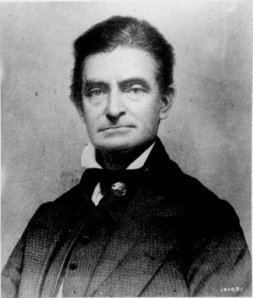On October 16, 1859, abolitionist John Brown (a white man known for his violent opposition to slavery) and 21 armed followers seized the United States Armory and Arsenal at Harpers Ferry, Virginia (now West Virginia). The would-be revolutionaries, including three free Blacks, one freed slave, and one fugitive slave, hoped to incite a rebellion of freed slaves and overturn the institution of slavery by force.

John Brown as a younger man
Brown’s goal was to do whatever it took to get slaves released from bondage; he felt anything less would make a mockery of God’s words as Brown understood them. As he told his interrogators after his arrest:
I want you to understand, gentlemen, that I respect the rights of the poorest and weakest of colored people, oppressed by the slave system, just as much as I do those of the most wealthy and powerful.”
The small band was no match for the U.S. Marines however, and on October 18, under Colonel Robert E. Lee, the Marines stormed the armory, freed the hostages, and arrested Brown and his men.
Brown was tried for treason by the state of Virginia, but stated that he believed he was doing “God’s work” in trying to end slavery.
One of those who joined John Brown on his quest to strike a blow for the freedom of slaves was Lewis Leary, a free Black harnessmaker from Oberlin, Ohio. He was married to Mary Patterson, a mixed-race woman who was an Oberlin College graduate. Leary had become involved with abolitionists in Oberlin, which had an active community and from which John Brown recruited him to join the raid. Leary died from wounds suffered in the conflict at Harpers Ferry.
His widow Mary later remarried an ardent Brown supporter, Charles Langston. In her old age, Mary raised her grandson, wrapping him in a bullet-riddled shawl that Lewis had worn at Harpers Ferry. That boy was Langston Hughes, the poet who made his name as a member of the Harlem Renaissance. In 1931 he wrote this poem addressed to Black Americans who are “now free,” exhorting them to remember abolitionist John Brown (1800-1859), his raid on Harpers Ferry, his trial and execution:
Perhaps
You will remember
John BrownJohn Brown
Who took his gun,
Took twenty-one companions,
White and black,
Went to shoot your way to freedom
Where two rivers meet
And the hills of the
North
And the hills of the
South
Look slow at one another —
And died
For your sake.Now that you are
Many years free,
And the echo of the Civil War
Has passed away,
And Brown himself
Has long been tried at law,
Hanged by the neck,
And buried in the ground –
Since Harpers Ferry
Is alive with ghosts today,
Immortal raiders
Come again to town –
Perhaps,You will recall
John Brown.”

Langston Hughes
Filed under: legal | Tagged: Black History, History |





Thanks for this History about John Brown and his Black Warriors! It seems like the more I learn the more I realize I don’t know! I promise myself I will keep learning and keep passing it on to my Grandchildren and all of those wishes too continue with the struggles!!